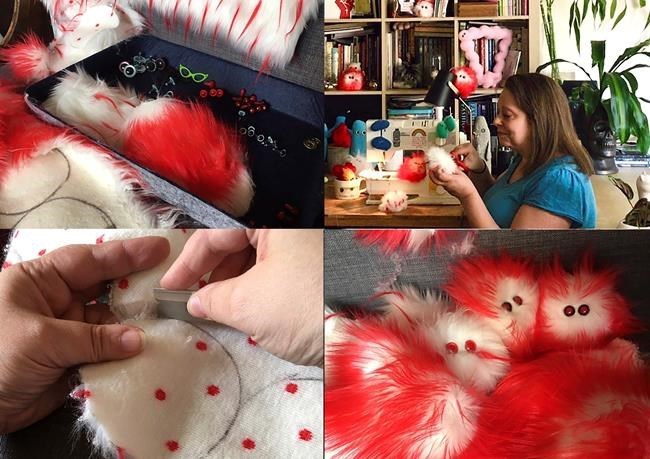
This combination of photos taken on July 25, 2020 shows Amy Micallef making her craft creations at her home. While Broadway stages remain dark due to the pandemic, Broadway workers are concentrating on side hustles. Micallef, a Broadway seamstress who has worked in the wardrobe departments of “Hamilton,” “Waitress” and “Frozen,” makes gleeful representations of COVID-19 for sale, complete with a pair of eyes and faux fur. (Amy Micallef via AP)
July 29, 2020 - 9:30 AM
NEW YORK - Broadway seamstress Amy Micallef hasn't put her talent on hold while theatres are shut. She's been making plush toys — unusual plush toys.
Micallef, who has worked in the wardrobe departments of “Hamilton,” “Waitress” and “Frozen,” makes gleeful representations of COVID-19, complete with a pair of eyes and faux fur. Each one goes for $23 and she encourages buyers to unleash their anger on her creations.
“Sometimes you need to throw something against the wall, you need to step on something. Do you want to run that thing over with your car? Honey, be my guest,” she said. “Here is here is your chance for sweet, sweet vengeance.”
While stages remain dark, Broadway workers like Micallef are finding ways to keep the lights on at home with side hustles. Some teach dance. Some offer music lessons or acting tips via Zoom. Some make jewelry or sell skincare products or handmade journals.
"Actors’ normal side gigs are catering and even those jobs don’t exist. No one’s hosting parties," said Jeanna de Waal, who is to play the title role in the musical “Diana.” “A lot of people are having to learn new side hustles.”
The survival picture is certain to get darker when the government's $600-a-week pandemic compensation program expires this month. The relief group The Actors Fund has distributed more than $14 million in assistance to some 12,000 people, but more is needed. The city doesn't expect shows to restart until at least January.
“The arts and the entertainment sector as a whole is on the verge of the biggest existential crisis we’ve ever had,” said Adam Krauthamer, the president of Local 802, which represents musicians. “We’re on the edge of the cliff.”
He said many of his 7,000 members are taking a hard look at their careers and may not return to Broadway orchestra pits or symphony spaces.
“If the right politicians and philanthropists and people who help the arts are not engaged to put together a program that will save culture and the arts in New York City, it’s going to change as we know it forever.”
Ali Solomon's career was finally soaring when the pandemic hit in mid-March. Like many Broadway artists, she had a patchwork of jobs: She was an associate choreographer for the off-Broadway show “Trevor: The Musical,” the tour choreographer for “Charlie and the Chocolate Factory” and was helping a show in development. All were stopped — but rent wasn't.
“You’re at the top of your game after working for so many years and now to go find a job in another industry, where do you start? You’re at the bottom of the totem pole. You’re lucky if you’ll make minimum wage,” she said.
To make ends meet, she is a skincare consultant for Rodan and Fields and teaches — both in-person at a studio on Long Island and virtually for PassDoor, an online dance studio created by Broadway veterans.
“I’m starting to add little bits of income. None of it will compare to what I was making before. But it’s something and luckily I’ve been able to save. But the fear, though, is that nest egg that you’ve been saving is quickly going to diminish because the cost of living is so high.”
De Waal has gone from acting to hiring. She's put her focus on Broadway Weekends, a company she and her sister, Dani, started in 2017 offering in-person theatre camps for adults. Following the shutdown, she decided to focus online and recruited fellow performers. “All my friends were unemployed. So it was very easy to ask around.”
Broadway Weekends now offers 20-30 classes a week on Zoom, charging $39 a month for unlimited access. Enrollment has rocketed to over 7,000. De Waal is paying her teachers and is working to establish a non-profit version and an educational arm for school kids.
Jenny Florkowski, a veteran at “Wicked,” crafts jewelry on the side and is also looking to the wider community. She gives away all proceeds from sales of her beaded and friendship bracelets to the NAACP Legal Defence Fund and Color of Change.
“During this time, a lot of performers feel they've lost their purpose,” she said. “It was nice to connect with a lot of people and feel like we were all giving towards something bigger than ourselves.”
Broadway producers have donated millions of dollars to emergency funds and one has even reached into her own pocket to employ 70 dancers to lead free virtual dance-exercise session classes.
Jenna Segal, the co-producer of such shows as “Hadestown” and “What the Constitution Means to Me,” launched Get In Shape Grrl! on Facebook and has expanded it to an app, attracting some 15,000 members.
“I just thought to myself, ‘Wouldn’t it be fun to bring Broadway to people who are sad because the season was just about to open? Let’s do something where they can participate and we can keep dancers employed,'” said Segal.
The pandemic has both revealed the creativity of the Broadway community and its fragility. Micallef, the plush toy maker, says her side hustle is barely enough to keep her in yarn. She still has faith.
“I have the benefit of knowing two very important things that I think most people may not believe," she said. "No. 1: This will end. It will. I promise it will. And second, there is good on the other side.”
___
Mark Kennedy is at http://twitter.com/KennedyTwits
News from © The Associated Press, 2020